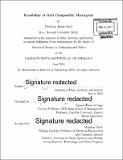Feasibility of grid compatible microgrids
Author(s)
Levi, Patricia Janet
DownloadFull printable version (12.93Mb)
Other Contributors
Technology and Policy Program.
Advisor
Ignacio Perez Arriaga.
Terms of use
Metadata
Show full item recordAbstract
There are 1.1 billion people in the world who lack access to electricity, mostly in rural areas. The expansion of the central grid has been slow in many developing countries, hampered by a lack of supply, poor finances, and politics. Distribution companies in these countries are often cash strapped, in a tremendous amount of debt and are unable to make adequate investments in infrastructure. Off-grid technologies can be the most cost-effective choice in remote areas, and they also can offer a solution for communities that will not receive reliable centralized electricity for many years. These solutions include solar home systems and microgrids. However, investment in microgrids has been discouraged by the risk of the central grid expanding into the service area of a microgrid. An attractive solution is to create technical standards for microgrids such that they are able to connect to the grid if or when it arrives, and to provide regulations for the integration of these systems into the operation of the main grid. This arrangement could reduce the risk to microgrid investors significantly. While existing literature speculates on the value of such a system, the costs and benefits have not been quantified. This analysis uses the Reference Electrification Model, a tool developed in collaboration by the Massachusetts Institute of Technology and IIT Comillas - Madrid, to assess the costs and benefits that might arise when using grid compatible microgrids. These results and an assessment of the regulatory context and forthcoming regulations show that grid compatible microgrids can provide significant social value, but only if supported by sufficient subsidies and a recognition of the costs imposed on society by depriving so many people of electricity.
Description
Thesis: S.M. in Technology and Policy, Massachusetts Institute of Technology, School of Engineering, Institute for Data, Systems, and Society, Technology and Policy Program, 2016. Cataloged from PDF version of thesis. Includes bibliographical references (pages 133-139).
Date issued
2016Department
Massachusetts Institute of Technology. Engineering Systems Division; Massachusetts Institute of Technology. Institute for Data, Systems, and Society; Technology and Policy ProgramPublisher
Massachusetts Institute of Technology
Keywords
Institute for Data, Systems, and Society., Engineering Systems Division., Technology and Policy Program.